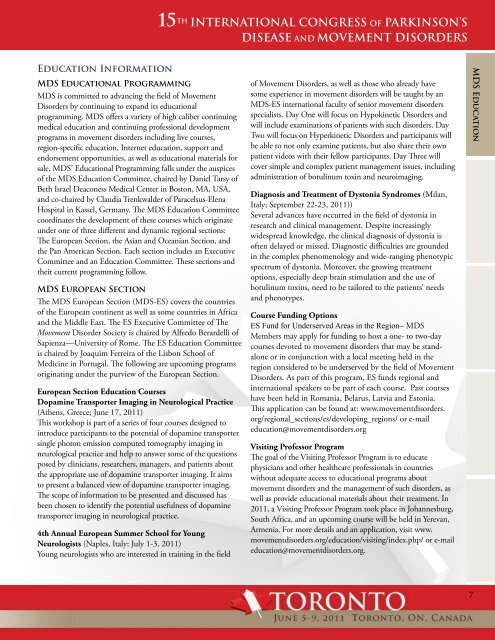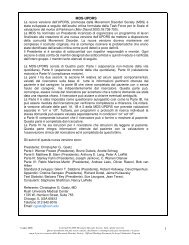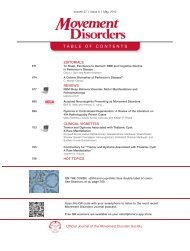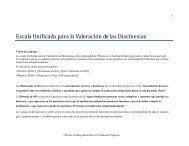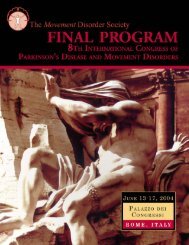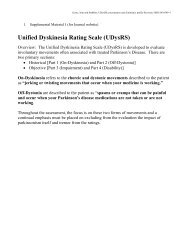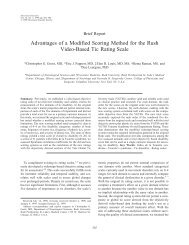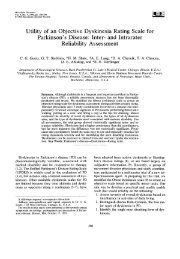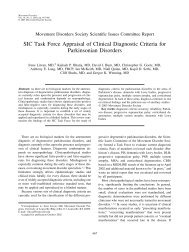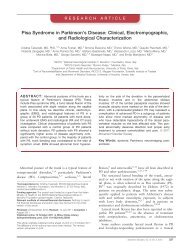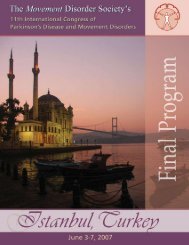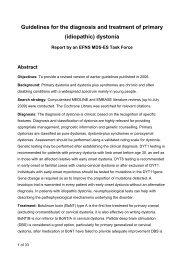15th INTERNATIONAL CONGRESS OF PARKINSON'S
15th INTERNATIONAL CONGRESS OF PARKINSON'S
15th INTERNATIONAL CONGRESS OF PARKINSON'S
Create successful ePaper yourself
Turn your PDF publications into a flip-book with our unique Google optimized e-Paper software.
Education Information<br />
MDS Educational Programming<br />
MDS is committed to advancing the field of Movement<br />
Disorders by continuing to expand its educational<br />
programming. MDS offers a variety of high caliber continuing<br />
medical education and continuing professional development<br />
programs in movement disorders including live courses,<br />
region-specific education, Internet education, support and<br />
endorsement opportunities, as well as educational materials for<br />
sale. MDS’ Educational Programming falls under the auspices<br />
of the MDS Education Committee, chaired by Daniel Tarsy of<br />
Beth Israel Deaconess Medical Center in Boston, MA, USA,<br />
and co-chaired by Claudia Trenkwalder of Paracelsus-Elena<br />
Hospital in Kassel, Germany. The MDS Education Committee<br />
coordinates the development of these courses which originate<br />
under one of three different and dynamic regional sections:<br />
The European Section, the Asian and Oceanian Section, and<br />
the Pan American Section. Each section includes an Executive<br />
Committee and an Education Committee. These sections and<br />
their current programming follow.<br />
MDS European Section<br />
The MDS European Section (MDS-ES) covers the countries<br />
of the European continent as well as some countries in Africa<br />
and the Middle East. The ES Executive Committee of The<br />
Movement Disorder Society is chaired by Alfredo Berardelli of<br />
Sapienza—University of Rome. The ES Education Committee<br />
is chaired by Joaquim Ferreira of the Lisbon School of<br />
Medicine in Portugal. The following are upcoming programs<br />
originating under the purview of the European Section.<br />
European Section Education Courses<br />
Dopamine Transporter Imaging in Neurological Practice<br />
(Athens, Greece; June 17, 2011)<br />
This workshop is part of a series of four courses designed to<br />
introduce participants to the potential of dopamine transporter<br />
single photon emission computed tomography imaging in<br />
neurological practice and help to answer some of the questions<br />
posed by clinicians, researchers, managers, and patients about<br />
the appropriate use of dopamine transporter imaging. It aims<br />
to present a balanced view of dopamine transporter imaging.<br />
The scope of information to be presented and discussed has<br />
been chosen to identify the potential usefulness of dopamine<br />
transporter imaging in neurological practice.<br />
4th Annual European Summer School for Young<br />
Neurologists (Naples, Italy; July 1-3, 2011)<br />
Young neurologists who are interested in training in the field<br />
15 th <strong>INTERNATIONAL</strong> <strong>CONGRESS</strong> <strong>OF</strong> PARKINSON’S<br />
DISEASE AND MOVEMENT DISORDERS<br />
of Movement Disorders, as well as those who already have<br />
some experience in movement disorders will be taught by an<br />
MDS-ES international faculty of senior movement disorders<br />
specialists. Day One will focus on Hypokinetic Disorders and<br />
will include examinations of patients with such disorders. Day<br />
Two will focus on Hyperkinetic Disorders and participants will<br />
be able to not only examine patients, but also share their own<br />
patient videos with their fellow participants. Day Three will<br />
cover simple and complex patient management issues, including<br />
administration of botulinum toxin and neuroimaging.<br />
Diagnosis and Treatment of Dystonia Syndromes (Milan,<br />
Italy; September 22-23, 2011))<br />
Several advances have occurred in the field of dystonia in<br />
research and clinical management. Despite increasingly<br />
widespread knowledge, the clinical diagnosis of dystonia is<br />
often delayed or missed. Diagnostic difficulties are grounded<br />
in the complex phenomenology and wide-ranging phenotypic<br />
spectrum of dystonia. Moreover, the growing treatment<br />
options, especially deep brain stimulation and the use of<br />
botulinum toxins, need to be tailored to the patients’ needs<br />
and phenotypes.<br />
Course Funding Options<br />
ES Fund for Underserved Areas in the Region– MDS<br />
Members may apply for funding to host a one- to two-day<br />
courses devoted to movement disorders that may be standalone<br />
or in conjunction with a local meeting held in the<br />
region considered to be underserved by the field of Movement<br />
Disorders. As part of this program, ES funds regional and<br />
international speakers to be part of each course. Past courses<br />
have been held in Romania, Belarus, Latvia and Estonia.<br />
This application can be found at: www.movementdisorders.<br />
org/regional_sections/es/developing_regions/ or e-mail<br />
education@movementdisorders.org<br />
Visiting Professor Program<br />
The goal of the Visiting Professor Program is to educate<br />
physicians and other healthcare professionals in countries<br />
without adequate access to educational programs about<br />
movement disorders and the management of such disorders, as<br />
well as provide educational materials about their treatment. In<br />
2011, a Visiting Professor Program took place in Johannesburg,<br />
South Africa, and an upcoming course will be held in Yerevan,<br />
Armenia. For more details and an application, visit www.<br />
movementdisorders.org/education/visiting/index.php/ or e-mail<br />
education@movementdisorders.org.<br />
7<br />
MDS About Education<br />
MDS


